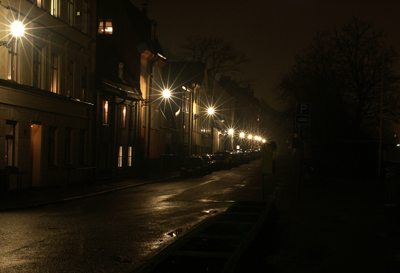Photographic paraphernalia is valuable and highly desirable and consequently a target for thieves. In poor rural areas of the world a photographer may be carrying the local equivalent of a lifetime's income. If you are careless someone will inevitably be tempted. However, it is not unusual to feel more threatened in the large cities of the industrialized world where theft is often associated with irrational behaviour, violence and personal injury. Whilst waiting, travelling or sleeping in the vicinity of strangers keep bags locked and secured to your body. Use a security belt, a traveller's combination lock or just rest your head or a limb on your bags. Keep a spare set of keys for all key locks in a separate location. The author once lost keys in Cuba and subsequently had to break into cases, car, house and domestic security system. However, remember that it is necessary to have equipment readily accessible if photography is the objective. A camera hidden from view in a secure backpack is of limited use so some compromise and risk must be accepted.
 |
| Public domain image by wyrls - freeimages.com |
Over the years I have tried most methods of concealing and securing photographic gear. The simplest approach is to carry a camera and zoom lens in a plastic carrier bag disguised as everyday shopping. If it is switched on and appropriately set it can be used within a few seconds. Custom-made camera bags should be old and shabby. Smart new bags and cases emblazoned with a manufacturer’s name invite trouble. I have two top-opening Billingham shoulder bags, one smart and the other showing signs of age after decades of excellent service. When I travel everything goes in the old bag. It is kept zipped up whenever possible, and never goes out of my sight or grasp. I carry it with the shoulder strap over my head and the bag on the side further from the road or crowd. Sometimes I turn it so that the bag hangs down the front of my body. If using a back-pack I wear it on my chest to reduce the risk posed by bag-slashers. When seated, my foot is always through the strap. Even so, I have been surrounded and hassled by groups of youths, and had bags slashed with box cutters. A good approach in high-risk areas is to chain the camera to a security belt worn under clothing. I use a cheap webbing tool-belt linked to the camera by a length of substantial one-centimetre steel chain. This may seem excessive but it more or less eliminates the possibility of a camera being snatched or its strap being cut. Whatever system is adopted try to appear purposeful. Standing around looking lost with a map in one hand and a camera in the other increases the chance of being targeted.
Equipment left in hotel rooms is best locked in a safe, although few rooms have facilities large enough to store everything. Hotel safes behind reception are usually reliable but it is not completely unknown for valuables to vanish from them. Alternatively, lock gear into a hard case and chain the bag to a bed-frame with a traveller's combination lock and cable. Theft is then more of a challenge for dishonest hotel maids and chance thieves passing the room while door is left open for housekeeping. Exposed film is best left at your accommodation where it should be reasonably safe and cool. Thieves generally want items they can convert into cash, so are unlikely to be interested in film.
Finally, don't overlook personal safety. All sorts of devices can be used for protection in particular destinations. A 120-decibel dog scarer was useful in Tibet where there are thousands of stray canines, and I have used a monopod for self-defence on the streets of western cities. Wise travellers recognize the limitations of their knowledge and experience, and always seek and heed local advice. Tell someone local what you intend to do, and ask their opinion. Local guides, typically students wanting to improve language skills, can be useful. Their presence by your side offers quite a bit of protection, but be careful who you engage. If you don’t speak the language, carry an hotel letterhead to show to taxi drivers when you get lost. Make yourself inconspicuous by dressing down in a manner that is casually sympathetic to local customs. Ethnic origins cannot be disguised but the impact of your presence can be minimized. Don’t go native or wear expensive rings, watches or other jewellery. Money and valuables should not be carried unnecessarily in the street if they can be stored securely elsewhere. Remain sensitive to circumstances, be flexible and know when to leave. Take risks where you have to, but do so knowingly and based upon the best information available. Above all, use common sense.






